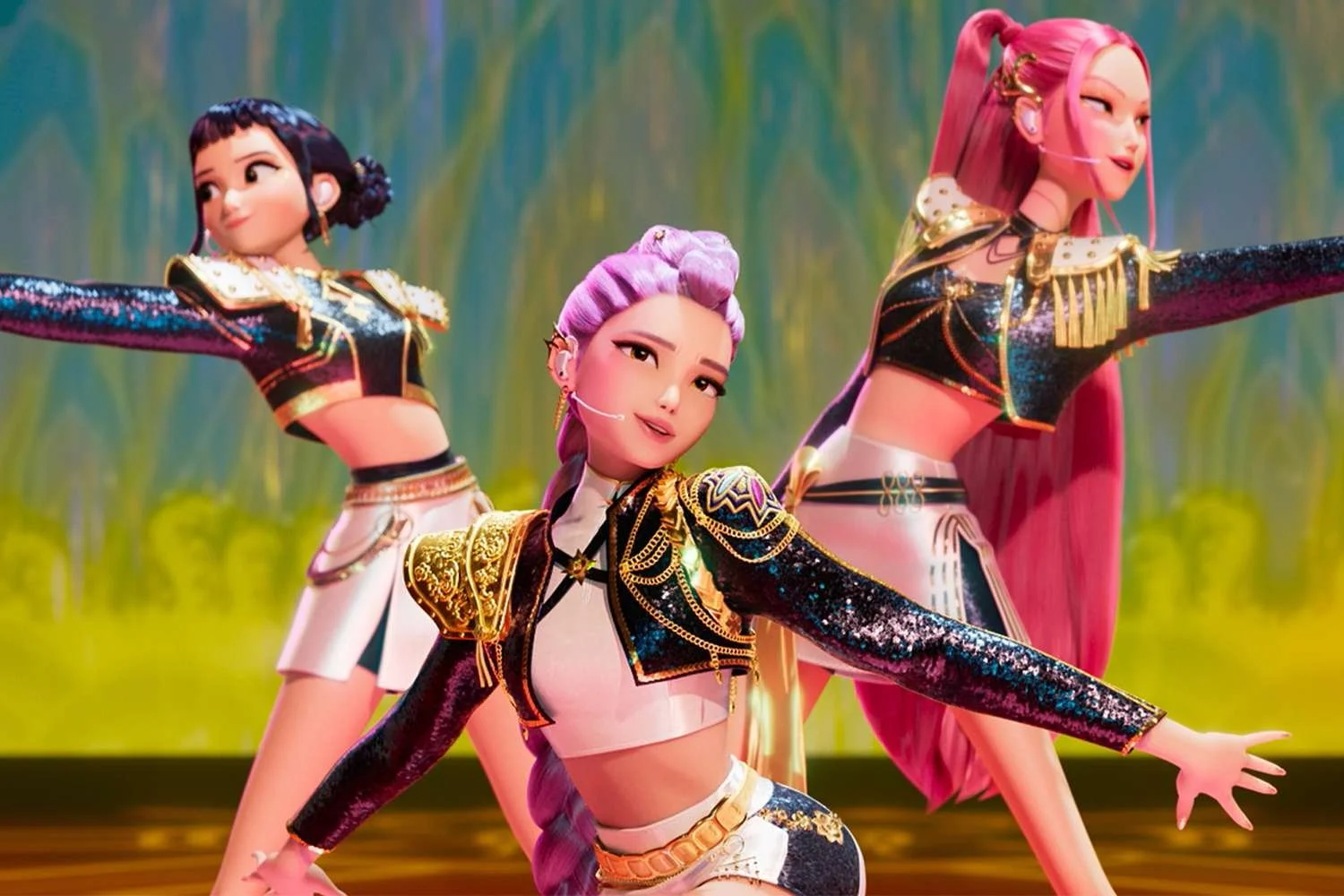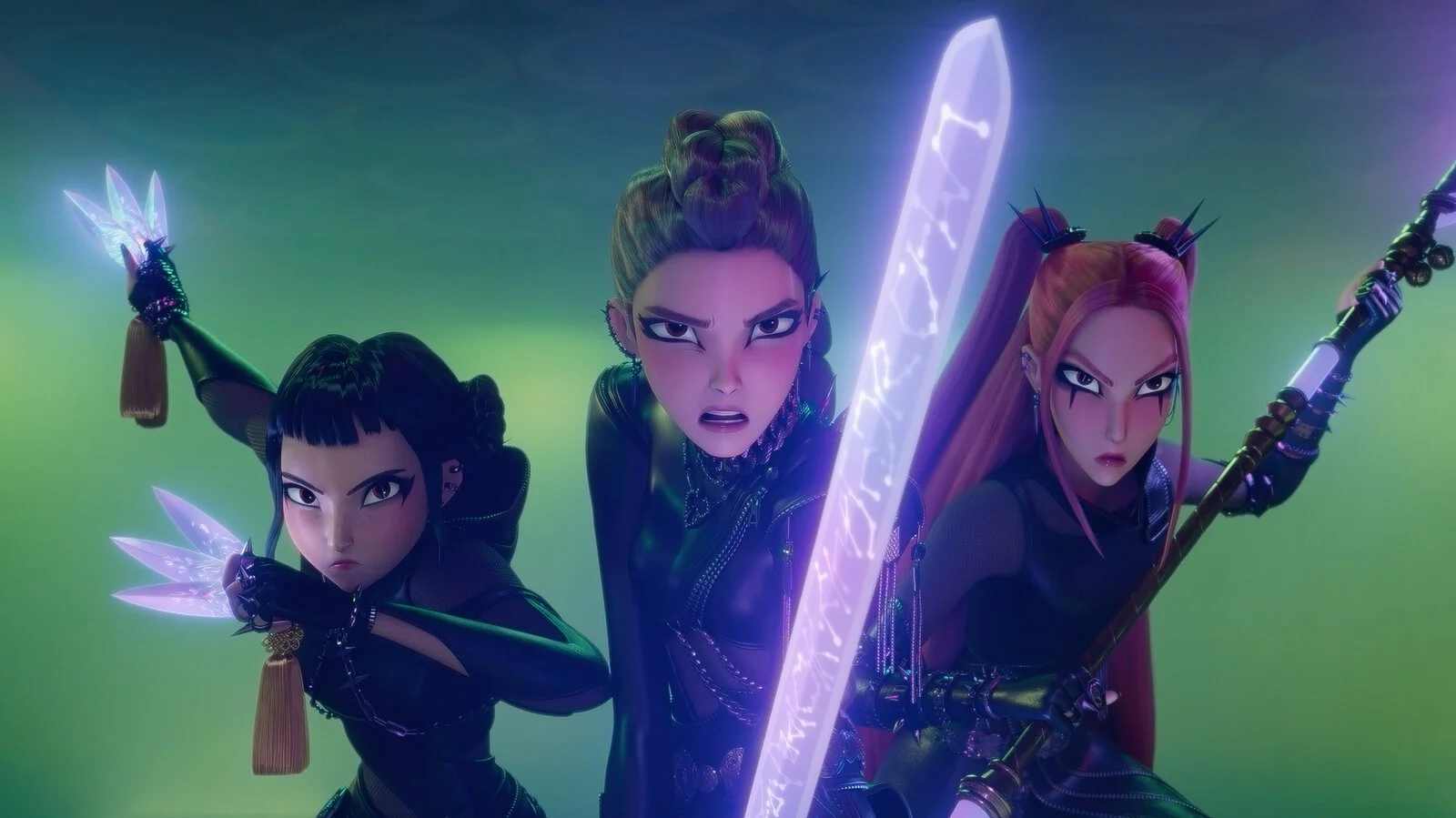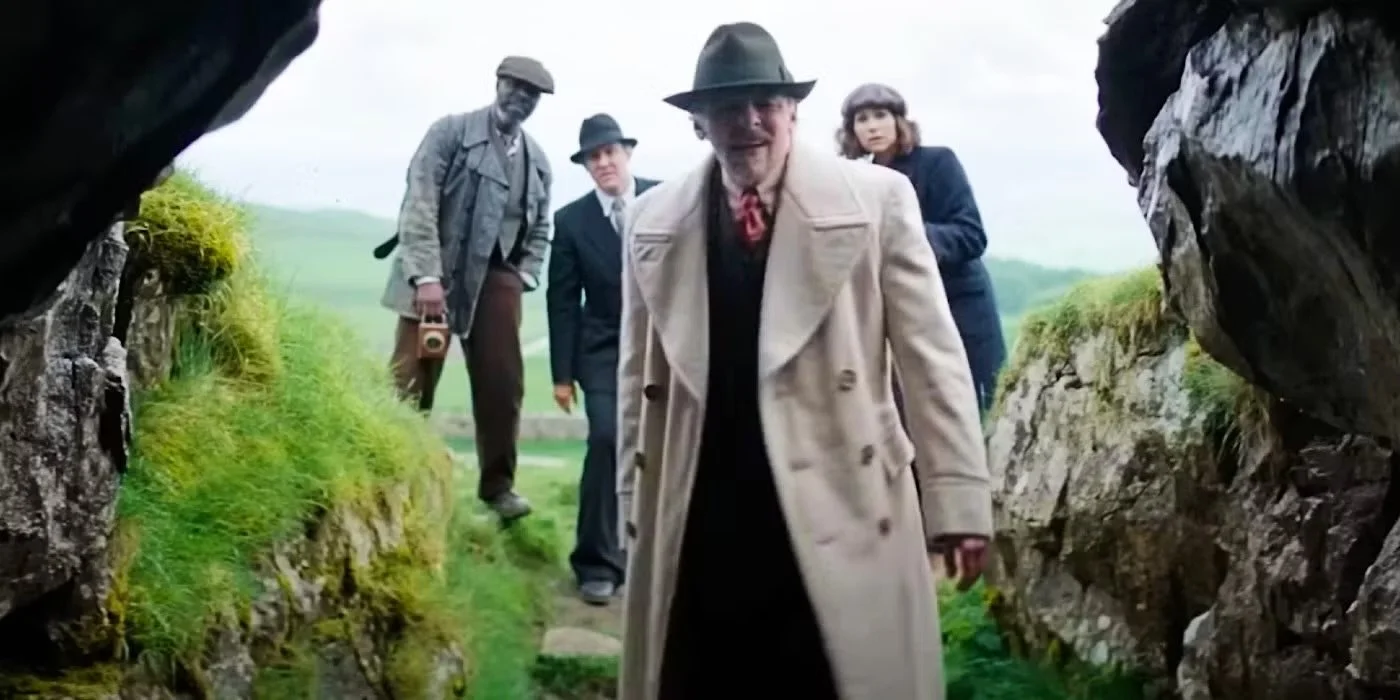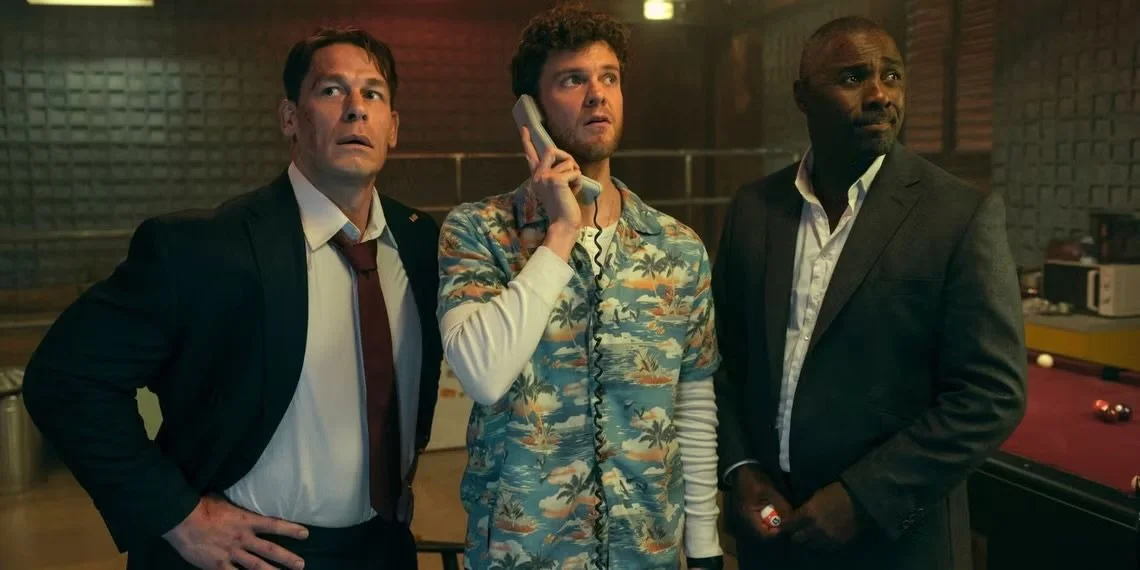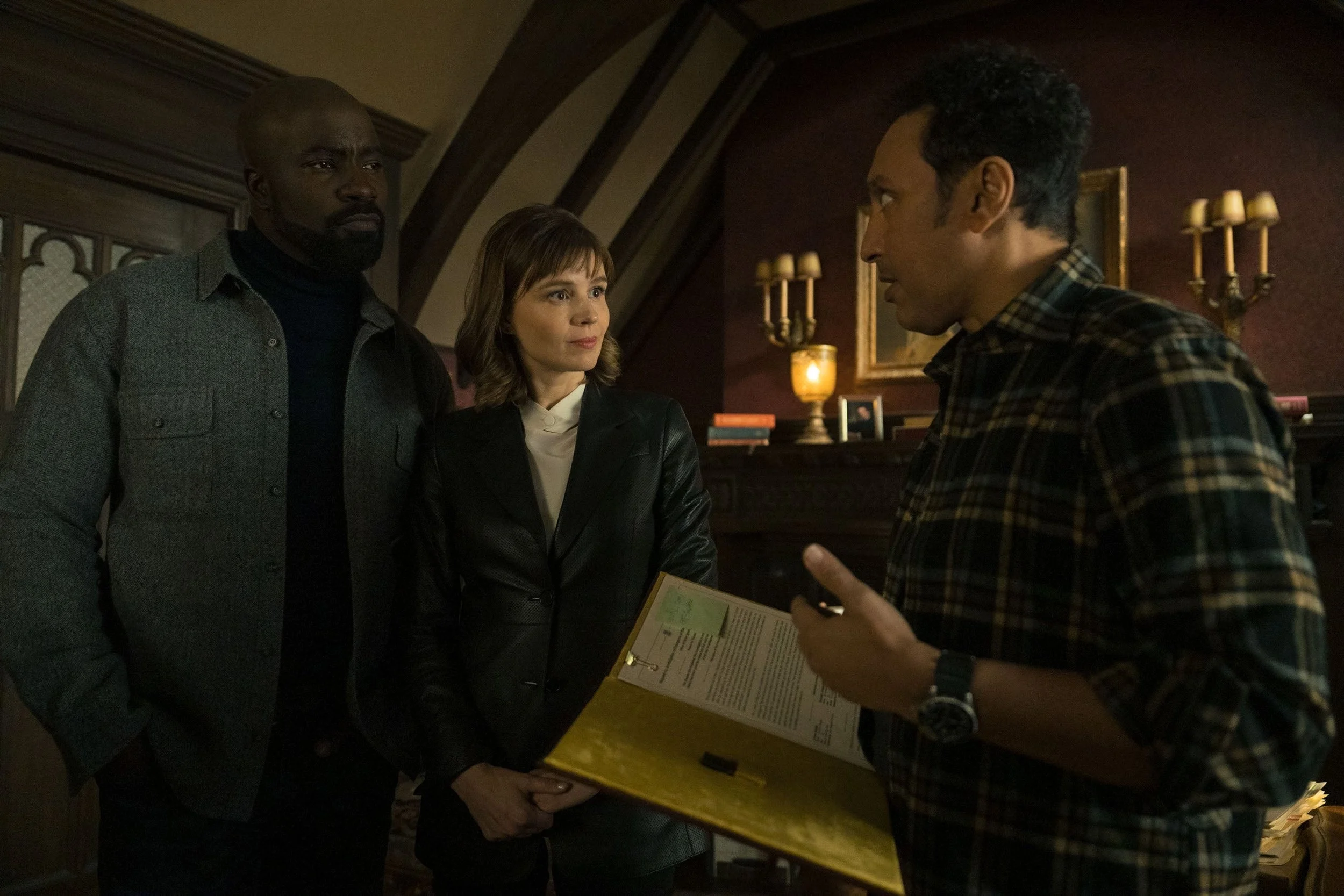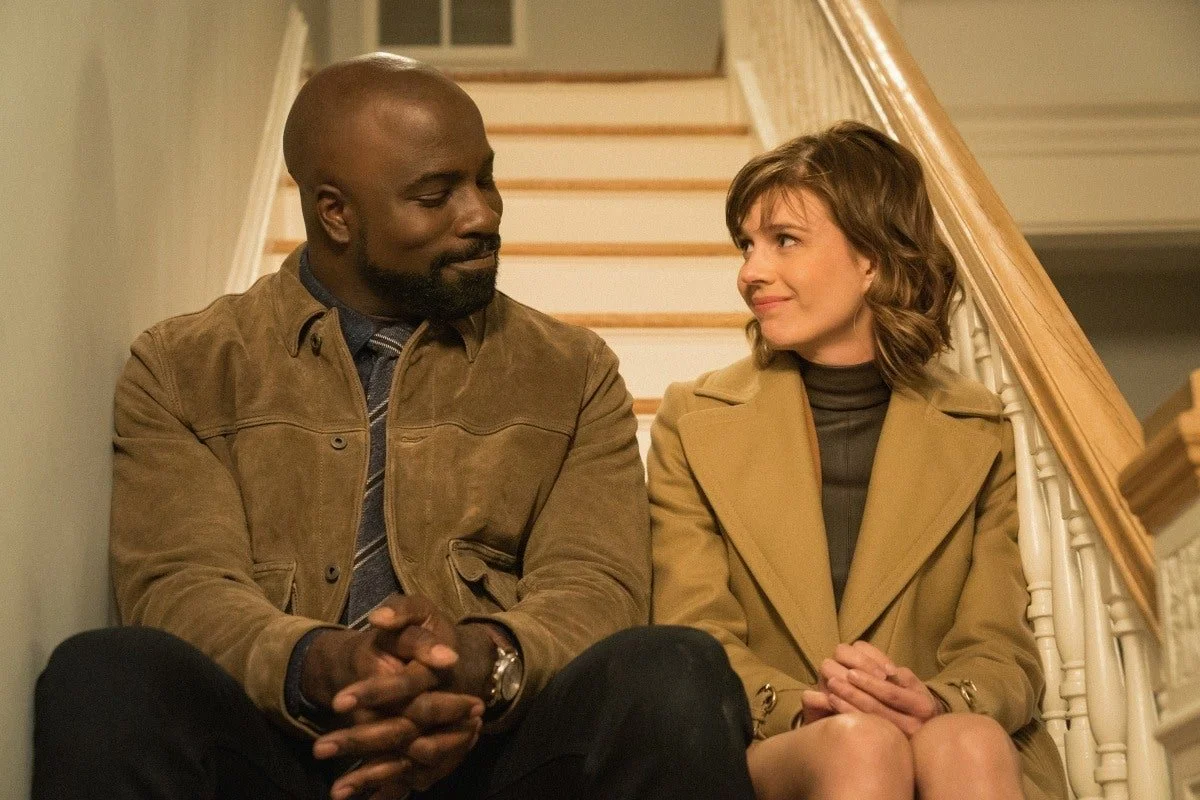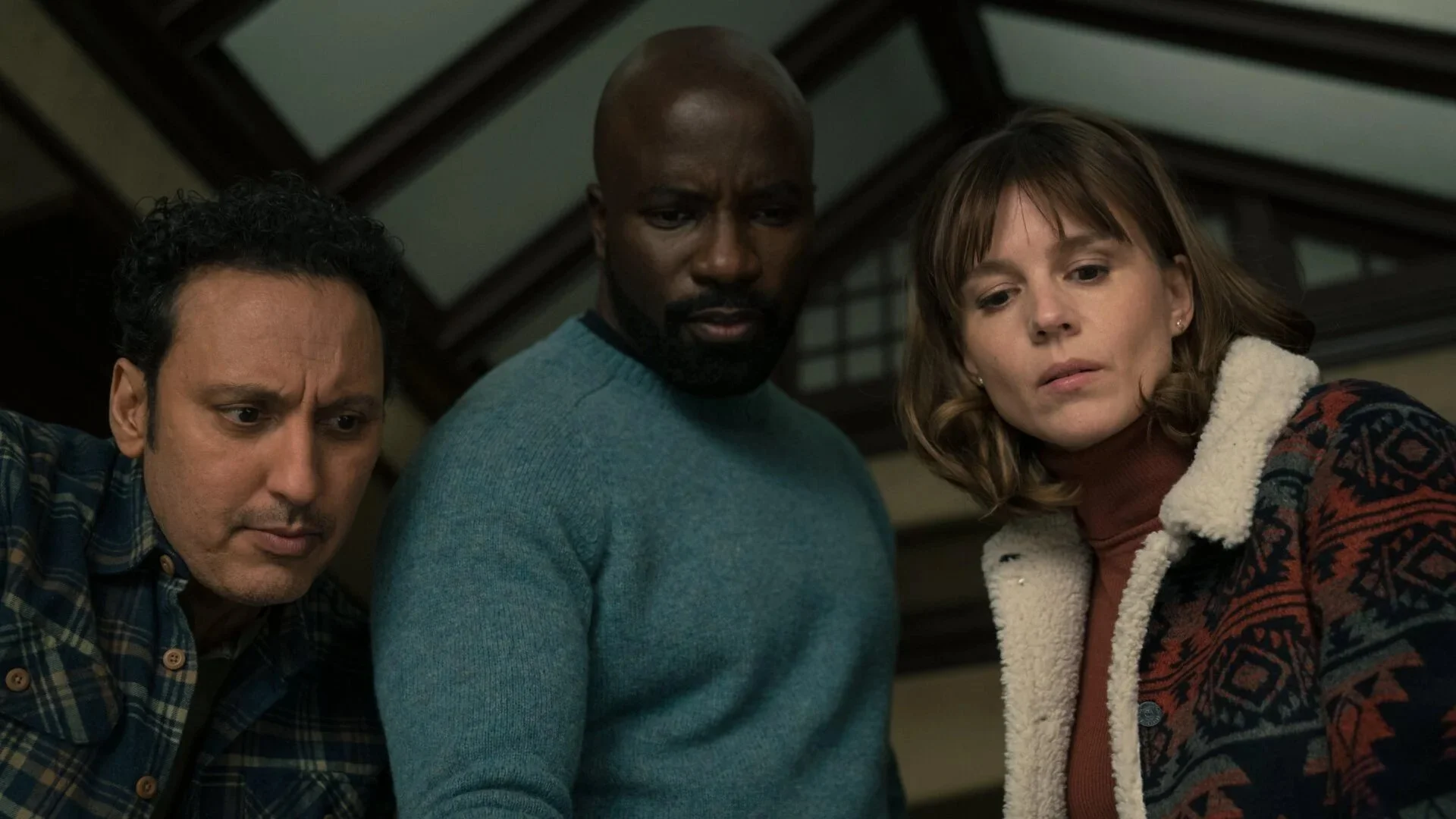This is possibly the most preposterous setup for a movie that I can remember bringing to you, even more so than using improv comics to train undercover cops—throughout the ages, singers have been using their songs (and weapons, of course) to fight demons and protect our world, a tradition now carried on in the form of K-pop idols. In the case of Netflix’s new film, KPop Demon Hunters, it’s the girl group Huntr/x, made up of Rumi, Mira, and Zoey. Rumi’s mother was a K-pop singer and demon hunter herself and died when Rumi was young, so she was raised by her mother’s bandmate and Huntr/x’s mentor Celine (voiced by Yunjin Kim). Mira was the black sheep of her family, never fitting in, and grew up ostracized from them. Zoey is a Korean-American, born and raised in Burbank, living with one foot in two different worlds, balancing on the tightrope of her heritage and her surroundings.
With a little exposition and flashback, we get to the first scene of the narrative. A stadium full of screaming fans. A nervous manager wondering where his group is as their plane flies inexplicably away from the stadium. Then we finally get to meet Huntr/x, aboard their jet, devouring snacks Monkey D. Luffy style to carb up for the show. When the manager, Bobby, played by Ken Jeong (Community, he can never die), calls them to ask where they are, they notice some odd things about the flight crew. Watering plants with coffee (I can’t imagine that’s good for them), unable to work a seatbelt, and then the telltale sign—purple patterns on their skin. Yeah, turns out the flight crew is all demons and we get the first musical number of the film. And it’s a pulse-pounding pop anthem that gets your toe tapping (or more if you have rhythm, which I, sadly, do not). The fight is a fittingly exciting and inventive combination of music and action from the studio that brought us the Spider-Verse films (though the creative team is different and the animation is unique, you can see the DNA). It’s a very strong opening to the film as they make it to the stadium for their show.
After the demons are vanquished, they get a dressing down from the Demon King, Gwi-ma, voiced by Squid Game alum Lee Byung-Hun. He’s interrupted by one demon, called Jinu, singing a folk ballad about Gwi-ma losing his grip on Earth to the songs of the demon hunters and he proposes a bold strategy: create a demon boy band to take away the fandom of Huntr/x, which is the power that keeps the demons at bay. There is a magical barrier that keeps Gwi-ma from taking over the Earth called the Honmoon and it’s powered by the songs and the fans; the more fans they have, the stronger the barrier. The more together and enthusiastic the fans are, the stronger the barrier. The demon Jinu strikes a bargain with Gwi-ma—help him take over the Earth by defeating Huntr/x in exchange for Gwi-ma erasing his memories. Feed Gwi-ma enough souls and he’ll be free.
Just at the start of Huntr/x’s two week vacation, Rumi decides to surprise release their next single “Golden”, a catchy empowerment tune about their personal stories. However, not all is well with Rumi—at the end of the show, her voice started to go, as she was losing the ability to hit some notes. It’s at this point, it’s revealed to the audience that Rumi has some of the same markings that demons do, and through a series of touching flashbacks, we find out that Rumi’s father was a demon and she was instructed by Celine to hide her patterns. We also see the shame she feels and the extent to which she hides her patterns from her bandmates, always skipping out on group activities like going to the bathhouse, where her body would be exposed (these Korean bathhouses, called jjimjilbang, are like spas). All this happens in the first 15 minutes; this movie does not hang around and it has no interest in playing hide the ball.
When they contemplate announcing why they had to cancel the show and contacting Celine for guidance, they recite Celine’s mantra word for word: “We are hunters. Voices strong. Your faults and fears must never be seen.” A subtle nod to gender biases in society, where women are pressured to act a certain way or be deemed weak or pushy. This is further underlined by the next scene. They go to a quack doctor (voiced by Daniel Dae Kim, Lost reunion!) to have Rumi’s voice looked at and they stumble upon a street concert by the Saja Boys, the demon boy band. Their song is pure bubblegum pop—literally called “Soda Pop”—a lovely, catchy, generic song about the catchy generic pop fluff that goes into that kind of song. There’s nothing wrong with that; it’s fun, it’s romantic, it taps into that thing that makes songs like that popular. But it shows a stark difference in their music—Huntr/x’s tracks are strong, powerful songs of empowerment and the Saja Boys show up with lyrics like “You’re my soda pop” and are immediately almost as popular as they are. Even the outfits are diametrically opposed. Huntr/x wears dark and bold colors, the Saja Boys’ outfits are bright, with loads of pastels and florals, very flirty and light by comparison. Huntr/x has been at this for at least five years, but all it takes for the Saja Boys to rival them is one catchy single and some abs and people go crazy for them. With one little bow, they get audiences swooning over how respectful they are, something that kind of just should be baseline for anyone. It highlights without smacking you in the face that things are just easier for them. Now whether there’s some sort of magic that’s helping them gain popularity isn’t clear, but I don’t think there is. I think it’s just effective social commentary.
Huntr/x clocks them as demons immediately and during a fight, Jinu, now the lead of the Saja Boys, catches sight of Rumi’s patterns. And very demon-like of this demon, he realizes this is a weakness that he can exploit—because she has shame that she’s hiding. What happens next is a clandestine meeting between Jinu and Rumi, arranged by a magical and strange looking tiger with a hat-wearing crow friend. The tiger is really unnatural and cool, oddly cute; I really love this design choice. It screams magical in a world that has all this secretive magic going on and it’s just so neat to look at and enjoy. The crow is also quite interesting—I know I mentioned the hat already, but it’s also got more pairs of eyes than you’re used to seeing on a crow. They’ve both got a very Studio Ghibli feel to them in a movie that’s very much in the aesthetic world of Into the Spider-Verse, grounded in reality. In this meeting, Jinu tells his story to Rumi, haunted by it and his shame for the last 400 years, because Gwi-ma forces him to relive it constantly, with a ceaseless voice in his ear. This not only humanizes Jinu (and by extension, other demons), it also introduces the main theme of the movie and it’s one that’s terribly, terribly relevant.
Shame. Shame isolates. Shame cuts us off from support. From each other. Shame destroys. And sharing those things, the things that make you feel shameful that you should have no shame over—your past, your sexual orientation, your gender identity, or, in this case, your parentage—makes the weight of carrying them lighter. People carry so much with them all the time that it creates this burdensome feeling, a feeling that is not easy to shake off. Rumi has no control over who her father is, yet she’s compelled to hide who she is as a result. In isolation, her shame grows and therefore so do her patterns, robbing her of the thing she values most, the thing that makes her the hunter she is—her voice. And in this, she faces even more shame and fear. Letting Mira and Zoey down, losing grip on the Honmoon and the protection of Earth. She carries so much on her shoulders and because she’s has to keep this secret, there’s no one there to help her lift it up. Rumi goes so far as to call her birth—and subsequently her entire life—a mistake. That’s shockingly depressing and a very deep notion to touch on for what is ostensibly a kids’ movie, but it’s genuinely wonderful that the writers are willing to go there and handle it with such care. I know there are people who have felt this because they were different from others—in fact, I know people personally who have felt this. The idea that being different is some kind of mistake that you should be shameful over is entirely destructive. And Demon Hunters has the courage to make this a central theme to the film and I absolutely love that.
In fact, I absolutely love this movie, full stop. The animation is incredible and while nothing visually gives you the same chills as that moment in Into the Spider-Verse, so many frames of this are just pure art that you would want to put up on your wall (and I definitely would). It’s almost expected at this point that Sony will deliver in the animation department and it’s still enough to blow you away. What has become a Sony signature, and now a staple among many animated films, the way the animation style shifts is always such a visual delight and a skillful flex by the animators. I should take a moment to address the thing that’s making this movie such a sensation, even though it’s hardly as impressive to me as the rest of the film, the music. As much as K-pop isn’t my genre, I’d struggle to say there’s a song I didn’t like, even the so-sweet-it’ll-make-your-stomach-ache “Soda Pop” with its purposely infectious melody and catchy refrain works for me. The music is also synched so well with the action sequences, it reminds you what was missing from Across the Spider-Verse (a fantastic movie in its own right and more than a worthy sequel to the basically perfect Into), which eschewed the strong, original, thematic hip-hop soundtrack in favor of an original score. It lost a little of its identity (I hope we’ll see a return to that for the sequel to Across) and Demon Hunters has personality in spades in large part due to the original soundtrack.
It may not be a perfect film—other than Jinu, I wouldn’t even call the Saja Boys stock characters, they’re little more than backup singers. They have no personality and very few lines, if any, outside of the songs. Just about no characterization occurs with any of the Saja Boys who aren’t Jinu, but it’s not so much a flaw as a side note; they’re the bad guys, they’re literal demons, we get it. The bigger issue is that Mira and Zoey aren’t given nearly the same care that Rumi is and their stories happen quite quickly. Indeed, Rumi is the main character of this story even though on its face it seems like it’s supposed to be about all three of them, but with what a sensation this has become, I hope there’s room in Netflix’s budget for more depth in the future. There’s a lot there that could have been said, but wasn’t. Mira’s background is interesting, cast out from a wealthy family for being different, although how she’s different exactly, other than her fashion choices and Daria-like attitude, is not really examined, just stated. When we were introduced to Zoey’s story, I was excited to see that explored in a film, because that’s my background. Sure, not Korean-American specifically, but I am a first generation Asian-American born in the US, having to balance on that two world tightrope myself; I wanted to see that told in a movie this big. But it’s just a few words here and there that speak to her background. I was dying to see more about Zoey’s upbringing and her struggles, but, again, it’s Rumi’s show. Not that I’m complaining because Rumi’s story is extremely compelling and deeply realized, but it’s definitely left me wanting more from Huntr/x’s trio. The movie is only 95 minutes long and it feels like every frame is jam packed; we definitely could have had more time in this and I wouldn’t be opposed to a director’s cut that gives us more of this film (though I don’t know how feasible that is for something animated).
A few problems aside, this is one of the best movies I can remember seeing in years. I don’t think there’s been another movie that I just wanted to start over once the credits rolled since The Unbearable Weight of Massive Talent. While its themes are well-trodden, its execution is what makes it a standout. It was such a surprisingly emotionally resonant film for me, which goes to the power of music in general, but also to the strength of the storytelling—narrative, visual, and aural—of Demon Hunters that makes it such a fully a realized film. I want to call it successful, but not in the metric of watch-hours or clicks or whatever, I mean as a self-contained story, it’s well done in that it succeeds in doing what it set out to do. I’m not going to lie, this movie hit me much, much harder than I ever thought it would, making me feel pretty close to how Pedro Pascal feels about Paddington 2 (I agree with him)—I cried for the entire thing, it made me want to be a better man. What makes this movie so special is how it approaches sensitive topics with care and thoughtfulness, the strength of its self-acceptance message, and its reminder that as much as our worries—our shame—can force us into isolation, the burdens of life are better carried with people who are there for you and you for them. And that through leaning on each other to prop each other up, we can get through far more together than we can alone. This movie takes a fluffy premise and gets into deep concepts and if more blockbusters would do the same, I think we’d all be having a better time with movies and we wouldn’t be getting more recycled franchises. KPop Demon Hunters is a movie that stands on the shoulders of others and delivers an original idea without an established IP because the people behind it put care in every step of its creation and trusted its audience to understand its message. It’s a must watch.

